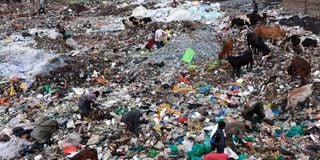Ministry pushes for circular economy to improve waste management

People collect recyclable materials at the Dandora dumpsite in Nairobi on December 9, 2020. One kilogram of plastic bottles sold for Sh15 at that time.
The Ministry of Environment announced Monday that it plans to incentivise the circular economy sector as one of the ways of managing waste in the country.
A circular economy ensures some materials produced at the industry level can be re-used differently to curb environmental pollution.
Environment Cabinet Secretary Soipan Tuya made the announcement during the first Loop Forum Kenya event organised by the Ministry in partnership with the Danish and Netherlands embassies, as well as manufacturers.
The CS noted that the challenge with using the circular economy as a way to manage waste is the need for a mindset shift. As such, she said, the ministry will sensitise relevant authorities to help in educating the people.
In partnership with county governments, the CS further said, the ministry is in the process of developing an intergovernmental framework for coordination and engagement between the ministry and the Council of Governors.
“Some of the discussions we are engaging in are on the need to mainstream the area of taxes and levies to support waste collectors and avoid double taxation,” she said.
“While this is the first event of its kind, it will not be a hit and run because we aim to have such conversations as a way of sensitising people to close the gap on waste management. As the Kenya Kwanza administration, our key focus under the plan is focused on the people, planet and profit.”
In his address, Mamo B Mamo, director-general of the National Environment Management Authority (Nema) said that as much as waste management is everyone’s responsibility, Nema is working with counties to ensure this is done at the source.
“Managing waste at source has been difficult because counties do not have adequate resources. We will ensure counties are equipped to handle waste management,” he said
Last year, Parliament passed the Sustainable Waste Management Act 2022, whose aim is to promote the circular economy and responsible public behaviour on waste management.
Mr Mamo highlighted the need for Parliament to fast-track the passing of a Bill on extended producer responsibility. This regulation will reinforce the need for a circular economy at industry level as it will ensure manufacturers produce environmentally friendly items.
Ambassador Ole Thonke shared Denmark’s experience from about four decades ago, when a trend of fossil fuels importation, which was economically unsustainable, was dropped and renewable sources of energy embraced.
“The new regulations came with new incentives to move the renewable energy industry. If we are moving to the circular economy business, we should tap into the local market already here and help them grow,” he said.
Regarding the Bill, CS Tuya said the ministry will ensure it is passed in the coming weeks.
She also said her ministry will, in the coming months, finalise a circular economy strategy, which will be crucial in making industries restorative and regenerative. A council on waste management will then be formed to oversee its implementation.
Kenya banned single-use plastic bags in 2017 but its enforcement is still taking shape as these products sometimes find their way to the country from the neighbours.
CS Soipan said the ministry will work with Parliament to streamline and enforce the ban.
“Kenya still stands as one of the boldest countries to actualise the ban on single use plastic bags. I assure you that I am keen on pushing the envelope further. [The ban] is just a tip of the iceberg,” she said.
The government’s project on planting 15 billion trees will use biodegradable tubings to grow the seedlings before they are planted.
“As we go into planting trees, we should not be producing plastic bags for the seedlings,” she said.





